By Allison Webber, UNA-NCA Program Assistant
The 2025 UNA-NCA Annual Membership Meeting was a vibrant and deeply engaging gathering that united a diverse community of members, partners, youth leaders, diplomats, educators, and advocates. It served as both a celebration of past achievements and a strategic space to reflect on the role of multilateralism in a world marked by uncertainty and transformation. Hosted by the United Nations Foundation and UNA-USA, the meeting took place in Washington, D.C. and was underscored by gratitude for the enduring commitment of the community to the United Nations and the critical need to sustain its partnership with the United States.
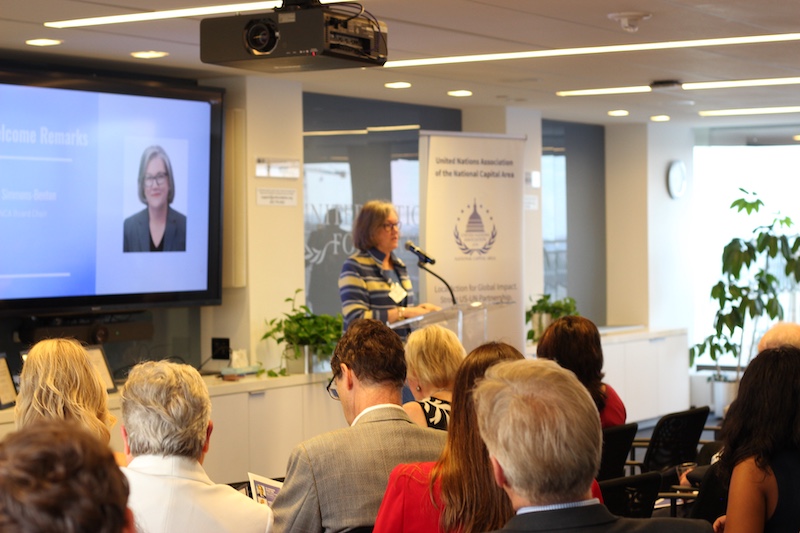 Board Chair Anne Simmons-Benton opened the meeting by welcoming attendees to the annual membership gathering, a moment to reflect on the year’s accomplishments and look ahead with purpose. She extended heartfelt gratitude to the UN Foundation and UNA-USA for their continued support and generosity in hosting the chapter. Acknowledging the presence of special guests, Anne emphasized the importance of gathering in person to affirm collective commitments to peace and global cooperation. "I can’t think of any time more important for us to be supporting multilateralism and the United Nations," she said, stressing the interconnected challenges the world faces—from climate change and famine to terrorism and fragile supply chains. She reminded the audience that no single country can address these challenges alone, and reaffirmed the UN's role in guiding collaborative solutions. She spoke with pride about the Summit of the Future at the United Nations this past fall, for which she and Paula Boland had partnered with Accenture in hosting a side event, noting the energy brought by youth and civil society. For Anne, this moment in UN history, its 80th anniversary, was not just a celebration but an opportunity to evolve, adapt, and engage with the pressing issues of our time. "With the United Nations, we have a shared vision on how we drive peace and how we help people face challenges no matter where they live," she affirmed. Her remarks set the tone for the evening, highlighting how local efforts, like those of the UNA-NCA, can have tangible global impacts.
Board Chair Anne Simmons-Benton opened the meeting by welcoming attendees to the annual membership gathering, a moment to reflect on the year’s accomplishments and look ahead with purpose. She extended heartfelt gratitude to the UN Foundation and UNA-USA for their continued support and generosity in hosting the chapter. Acknowledging the presence of special guests, Anne emphasized the importance of gathering in person to affirm collective commitments to peace and global cooperation. "I can’t think of any time more important for us to be supporting multilateralism and the United Nations," she said, stressing the interconnected challenges the world faces—from climate change and famine to terrorism and fragile supply chains. She reminded the audience that no single country can address these challenges alone, and reaffirmed the UN's role in guiding collaborative solutions. She spoke with pride about the Summit of the Future at the United Nations this past fall, for which she and Paula Boland had partnered with Accenture in hosting a side event, noting the energy brought by youth and civil society. For Anne, this moment in UN history, its 80th anniversary, was not just a celebration but an opportunity to evolve, adapt, and engage with the pressing issues of our time. "With the United Nations, we have a shared vision on how we drive peace and how we help people face challenges no matter where they live," she affirmed. Her remarks set the tone for the evening, highlighting how local efforts, like those of the UNA-NCA, can have tangible global impacts. 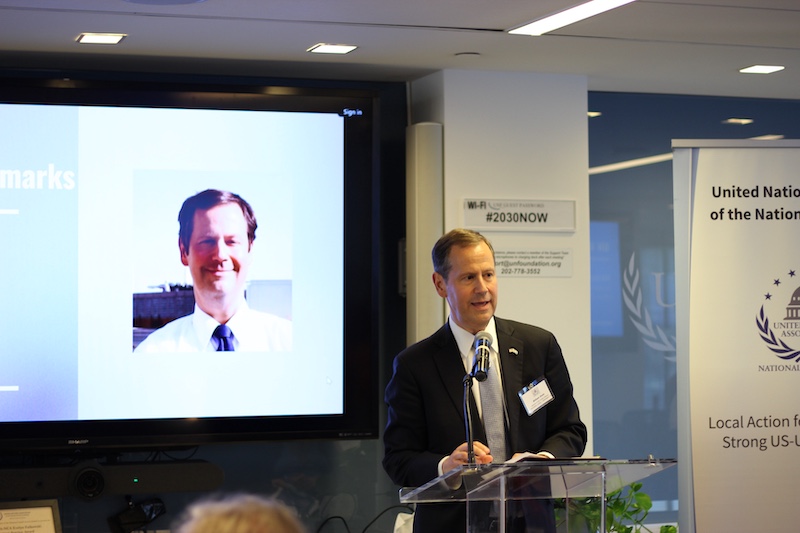 Guest speaker Will Davis, Director of the UN Information Center in Washington, D.C., brought a global perspective to the conversation, reinforcing the need for strong U.S.-UN engagement in an era of geopolitical competition and domestic budget constraints. “Your work in support of the U.S.-UN relationship has never been more timely, never been more urgent, and never been more important,” Davis told the audience, acknowledging both the challenges and opportunities ahead. He offered insights into how policy shifts, fiscal pressures, and staffing gaps affect the UN's ability to partner effectively with the U.S. government, but he also stressed that moments of uncertainty can give rise to innovation and reform. In his address, Davis delved into the significant transformation efforts being undertaken by UN Secretary-General António Guterres through the "UN 2.0" initiative. Commemorating the 80th anniversary of the UN, this reform agenda is not merely symbolic but rooted in a critical evaluation of how the UN must evolve to remain effective in today’s rapidly changing world. Davis emphasized that modern challenges such as climate change, AI governance, and mass displacement demand new structures, tools, and policies. The United Nations must not be an institution only of historical legacy but of current and future relevance.
Guest speaker Will Davis, Director of the UN Information Center in Washington, D.C., brought a global perspective to the conversation, reinforcing the need for strong U.S.-UN engagement in an era of geopolitical competition and domestic budget constraints. “Your work in support of the U.S.-UN relationship has never been more timely, never been more urgent, and never been more important,” Davis told the audience, acknowledging both the challenges and opportunities ahead. He offered insights into how policy shifts, fiscal pressures, and staffing gaps affect the UN's ability to partner effectively with the U.S. government, but he also stressed that moments of uncertainty can give rise to innovation and reform. In his address, Davis delved into the significant transformation efforts being undertaken by UN Secretary-General António Guterres through the "UN 2.0" initiative. Commemorating the 80th anniversary of the UN, this reform agenda is not merely symbolic but rooted in a critical evaluation of how the UN must evolve to remain effective in today’s rapidly changing world. Davis emphasized that modern challenges such as climate change, AI governance, and mass displacement demand new structures, tools, and policies. The United Nations must not be an institution only of historical legacy but of current and future relevance.The first stream of reform focuses on efficiency. The plan calls for a redistribution of staff away from costly headquarters like New York and Geneva to the regions where their work is most impactful. This move is not only cost-effective but designed to increase accountability, visibility, and responsiveness at the local level. The initiative also seeks to leverage artificial intelligence and digital technology to improve internal systems, reduce duplication, and enhance programmatic delivery. The second stream involves a comprehensive review of the 3,600 mandates currently active within the UN system, some of which are no longer relevant or are overlapping. By streamlining these mandates, the UN hopes to reallocate resources more effectively and reduce bureaucratic inertia. The third stream addresses structural reform. Davis described this as one of the more complex elements of the initiative, requiring the UN to reimagine its organizational chart, potentially merging or eliminating certain departments and offices to avoid redundancy and promote interdisciplinary collaboration. “These are not easy reforms,” Davis acknowledged, “but they are necessary if we want a UN that is ready to meet the challenges of today, not 1945.” He emphasized that change on this scale cannot be achieved unilaterally by the Secretary-General. It requires the approval, input, and trust of the Member States. Davis stressed that the United States, as a principal supporter and stakeholder, has a critical role to play in shaping and sustaining these reforms.
To illustrate the tangible importance of ongoing UN missions, Davis recounted a compelling anecdote about a peacekeeping mission in Western Sahara. A Special Representative’s brief and urgent pitch to U.S. officials underscored that continued UN presence was all that stood between stability and renewed conflict saying “if [the UN is] not there, conflict returns, chaos ensues.” The story reinforced the strategic value of UN missions in regions where U.S. diplomacy may be limited. To drive home the relevance of the UN in Americans’ daily lives, Davis shared his popular “airplane story,” demonstrating how UN agencies impact everything in our daily lives from international aviation safety to global communications and food regulations. “There’s a UN agency for that,” he quipped, reminding the audience that the benefits of multilateral cooperation are both global and local, both high-level and deeply personal.
President Paula Boland welcomed attendees with warmth and urgency, stating,“It’s really imperative... defending democratic values and ensuring a more just and sustainable future.” Her remarks set the tone for the evening, highlighting how local efforts like those of UNA-NCA can have tangible global impacts. She emphasized that multilateralism must be defended and strengthened through collective action, member engagement, and renewed commitment at every level of society. Ms. Boland also highlighted how the past year, though fraught with global and domestic challenges, offered opportunities for reflection, strategic planning, and renewed civic purpose. She reminded the audience that each individual present plays a role in shaping a better global future.
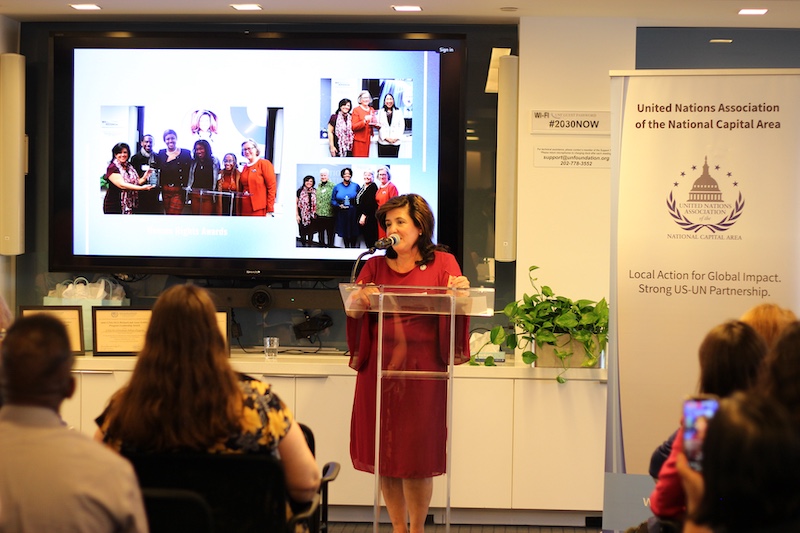 Paula also expressed appreciation to the organization’s network of volunteers, program assistants, board members, and partners, all of whom made the chapter’s recent successes possible. Their dedication, she noted, is what enables UNA-NCA to thrive as one of the most active and influential chapters of UNA-USA. In a time where civic trust and international alliances face serious strain, the local commitment to global partnerships has become more essential than ever. The meeting emphasized that by working together, through events, advocacy, education, and mentoring, UNA-NCA contributes to a world where peace, equity, and justice are not only aspirational but achievable.
Paula also expressed appreciation to the organization’s network of volunteers, program assistants, board members, and partners, all of whom made the chapter’s recent successes possible. Their dedication, she noted, is what enables UNA-NCA to thrive as one of the most active and influential chapters of UNA-USA. In a time where civic trust and international alliances face serious strain, the local commitment to global partnerships has become more essential than ever. The meeting emphasized that by working together, through events, advocacy, education, and mentoring, UNA-NCA contributes to a world where peace, equity, and justice are not only aspirational but achievable.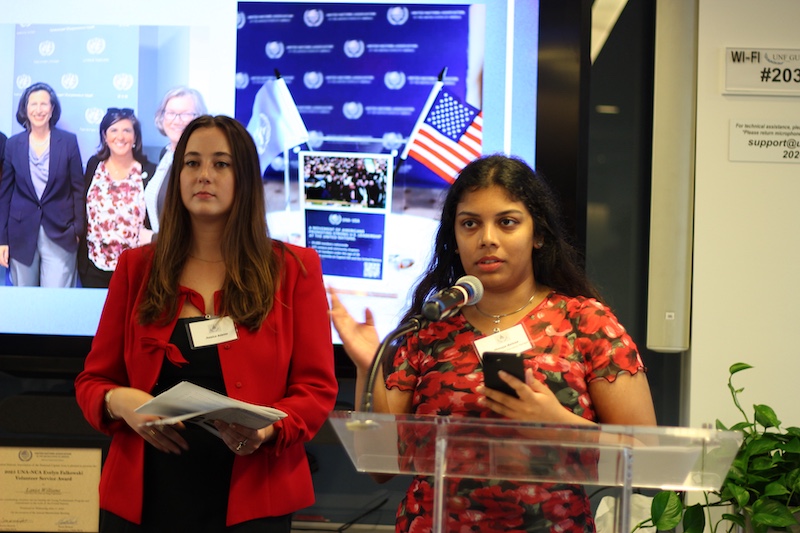 Staff and program beneficiaries shared milestones and innovations in UNA-NCA’s robust programmatic calendar. Through education, advocacy, and leadership development, the chapter continues to embody the UN’s principles in tangible ways that resonate with both the local community and the global agenda. The organization’s mission to educate and inspire the next generation of global citizens is realized through a dynamic range of offerings that extend beyond the classroom into real-world policy and diplomacy. The Global Classrooms DC Program offered life-changing opportunities to hundreds of middle and high school students in the DMV region. These young leaders participated in simulations and Model UN conferences at institutions such as the Pan American Health Organization and the U.S. Department of State. Participants addressed pressing topics such as health equity, global migration, and sustainable development. The conferences featured high-level speakers and provided a platform for students to practice diplomacy, negotiation, and coalition-building. A 2025 Model UN Conference Committee Chair shared, “Model UN has been crucial to my development. I watched students grow confident in their voices and work through conflict to propose real solutions.”
Staff and program beneficiaries shared milestones and innovations in UNA-NCA’s robust programmatic calendar. Through education, advocacy, and leadership development, the chapter continues to embody the UN’s principles in tangible ways that resonate with both the local community and the global agenda. The organization’s mission to educate and inspire the next generation of global citizens is realized through a dynamic range of offerings that extend beyond the classroom into real-world policy and diplomacy. The Global Classrooms DC Program offered life-changing opportunities to hundreds of middle and high school students in the DMV region. These young leaders participated in simulations and Model UN conferences at institutions such as the Pan American Health Organization and the U.S. Department of State. Participants addressed pressing topics such as health equity, global migration, and sustainable development. The conferences featured high-level speakers and provided a platform for students to practice diplomacy, negotiation, and coalition-building. A 2025 Model UN Conference Committee Chair shared, “Model UN has been crucial to my development. I watched students grow confident in their voices and work through conflict to propose real solutions.”The Graduate Fellows Program continued to be a cornerstone of UNA-NCA’s leadership pipeline. From a pool of over 100 applicants, 25 fellows were selected, representing remarkable geographic, cultural, and disciplinary diversity. Their seminar topics included global governance, climate justice, artificial intelligence, and international humanitarian law. The program connected fellows with experienced mentors, practitioners, and diplomats, fostering both intellectual growth and career advancement. According to one of the 2025 fellows, “This program served as a transformative experience and deepened our commitment to multilateralism, global cooperation, and sustainable development.
Advocacy remained a strong pillar of UNA-NCA’s impact. Throughout the year, the chapter mobilized constituents to engage policymakers in support of full U.S. funding for the UN and its agencies. Members also championed initiatives such as the second Decade for People of African Descent and elevated the voices of global human rights defenders. These advocacy efforts represent the chapter’s continued role as a civic bridge between local constituents and international policy.
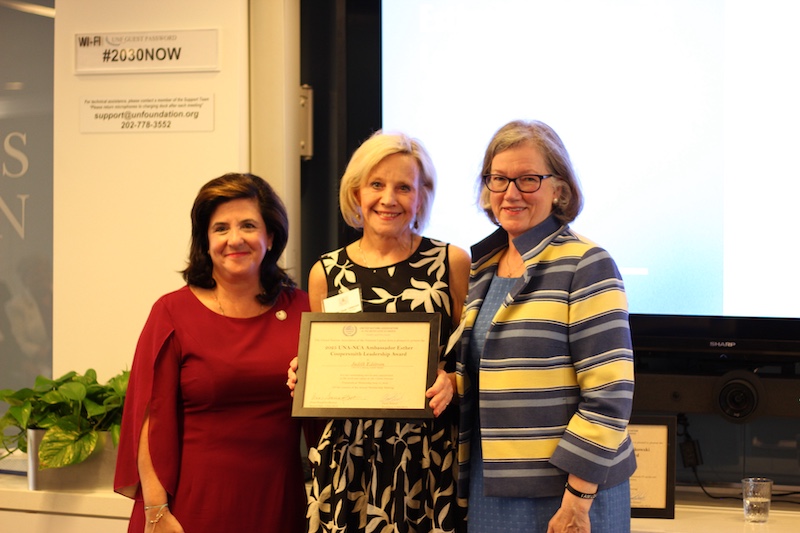 The evening included the celebration of individuals and programs that exemplify the highest values of volunteer service, mentorship, and transformative leadership. These honors underscored the intergenerational and interdisciplinary spirit of UNA-NCA’s mission. UNA-NCA Advisory Council and long time member Judy Edstrom was presented with the Ambassador Esther Coopersmith Leadership Award for her decades of multilateral leadership and unwavering commitment to social development, gender equity, and human rights. Her career in the World Bank and UN, including her work in South Africa and Indonesia, reflects the kind of global citizenry UNA-NCA seeks to nurture.
The evening included the celebration of individuals and programs that exemplify the highest values of volunteer service, mentorship, and transformative leadership. These honors underscored the intergenerational and interdisciplinary spirit of UNA-NCA’s mission. UNA-NCA Advisory Council and long time member Judy Edstrom was presented with the Ambassador Esther Coopersmith Leadership Award for her decades of multilateral leadership and unwavering commitment to social development, gender equity, and human rights. Her career in the World Bank and UN, including her work in South Africa and Indonesia, reflects the kind of global citizenry UNA-NCA seeks to nurture. 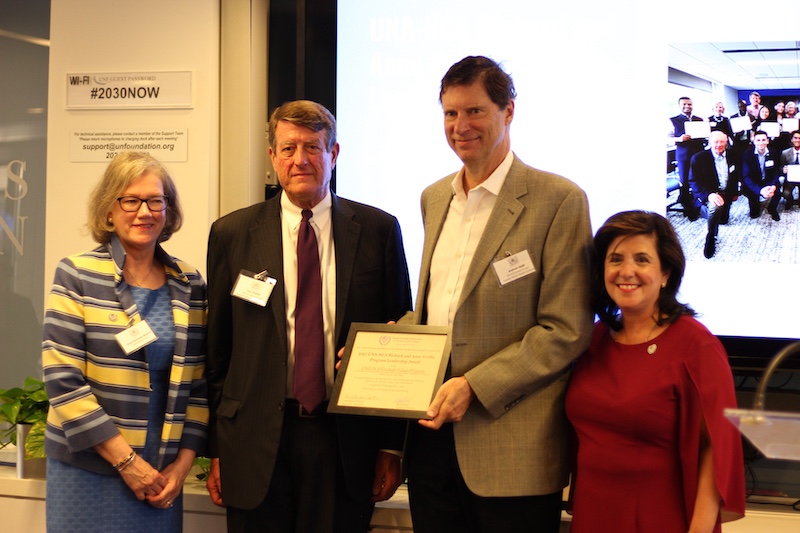 The Graduate Fellows Program received the Richard and Anne Griffis Program Leadership Award for its successful transformation over the past year. The program’s growth and innovations in recruitment, curriculum, and mentorship were recognized as setting a new standard for graduate-level engagement with international issues.
The Graduate Fellows Program received the Richard and Anne Griffis Program Leadership Award for its successful transformation over the past year. The program’s growth and innovations in recruitment, curriculum, and mentorship were recognized as setting a new standard for graduate-level engagement with international issues. 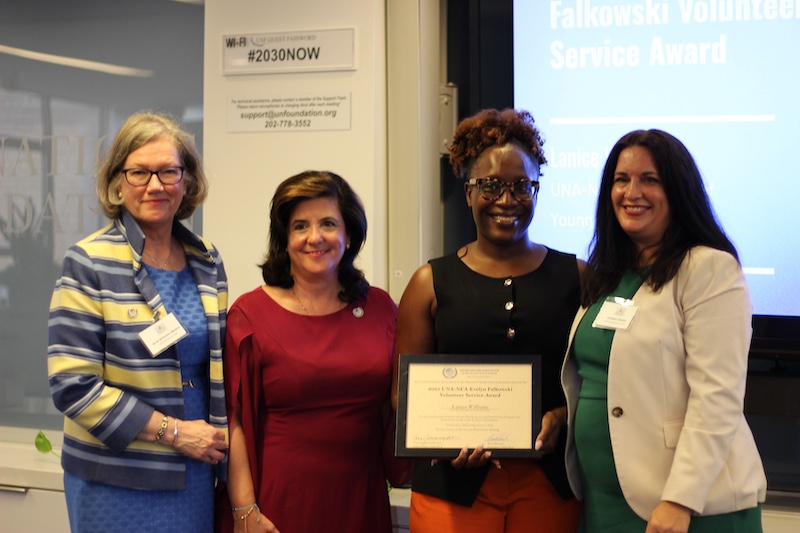 The Evelyn Falkowski Volunteer Service Award was presented to Lanice Williams for her efforts leading the Young Professionals Program and her tireless leadership in gender equity, advocacy, and community-building. Her work with youth and her efforts to broaden access to UNA-NCA programs have had a lasting impact.
The Evelyn Falkowski Volunteer Service Award was presented to Lanice Williams for her efforts leading the Young Professionals Program and her tireless leadership in gender equity, advocacy, and community-building. Her work with youth and her efforts to broaden access to UNA-NCA programs have had a lasting impact.The results of the 2025 Board elections were also announced. Led by Board members Kristen Hecht and Sultana Ali, the nominations committee managed a highly competitive and inclusive selection process. The new board members, drawn from diverse sectors including government, civil society, private sector and academia, will bring fresh energy and strategic focus to the organization’s priorities. Outgoing board members were honored for their years of dedication and guidance, leaving behind a legacy of resilience and innovation.
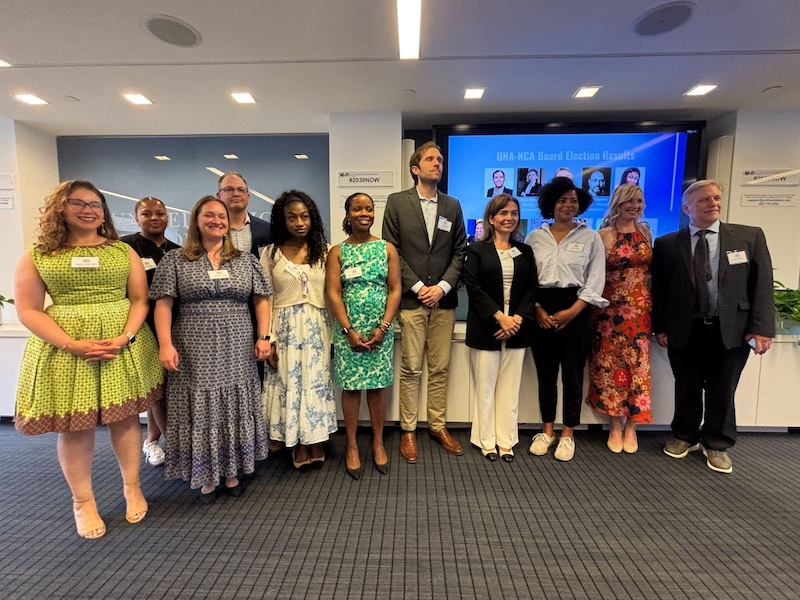 In her concluding remarks, Anne Simmons-Benton offered a call to action that resonated deeply with the spirit of the meeting: “Help us find the ones who still care, who still want to be part of something larger. Reach out, connect, and invite them in. The work ahead needs all of us.” As chairs were cleared and the reception began, the energy in the room remained electric—a testament to the power of shared purpose. With a refreshed board, growing programs, and a deeply engaged community, UNA-NCA looks toward the future with determination. The chapter stands as a model of how local engagement and international ideals can converge to build a more peaceful, just, and sustainable world.
In her concluding remarks, Anne Simmons-Benton offered a call to action that resonated deeply with the spirit of the meeting: “Help us find the ones who still care, who still want to be part of something larger. Reach out, connect, and invite them in. The work ahead needs all of us.” As chairs were cleared and the reception began, the energy in the room remained electric—a testament to the power of shared purpose. With a refreshed board, growing programs, and a deeply engaged community, UNA-NCA looks toward the future with determination. The chapter stands as a model of how local engagement and international ideals can converge to build a more peaceful, just, and sustainable world. 







